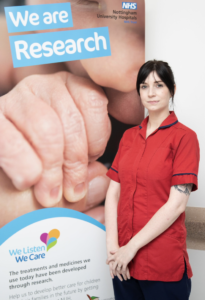Learning Points
- Patients have better outcomes through engaging in research and being treated in hospitals or NHS Trusts with active research programmes
- The role of research nurses is diverse and multifactorial, calling on clinical expertise alongside research, project management, and communication skills
- Nurse researchers undertake their own research, usually as part of their job or academic progression
- Opportunities for research and research funding come from a range of sources, and social media may be the best way to monitor projects and calls for participants
Introduction
Research is an essential part of a modern, effective health service, and is vital to the provision of effectual and safe health and social care. The NHS is an excellent environment for clinical research because it enables access to health care regardless of patients’ background.1 Across the UK, patients are being advised that it is their right to be included in clinical trials. Growth of the National Institute for Health Research (NIHR) in England and equivalent infrastructures in Northern Ireland, Scotland, and Wales has led to a rapid expansion in the clinical research nurse and research nurse/practitioner workforces to support clinical research.2
Principles of Research
All research involving humans is strictly regulated to ensure participants’ safety and wellbeing.3 The International Conference on Harmonisation Good Clinical Practice (GCP) guidelines prioritise the protection, safety, and wellbeing of trial participants, underscoring that no-one taking part in clinical trials should be harmed. Anyone working in clinical research must, therefore, have up-to-date training in GCP and act according to the tenets of The Declaration of Helsinki Ethical Principles for Medical Research Involving Human Subjects.4,5
Role of Research Nurses and Nurse Researchers
Research nurses play a vital role in ensuring clinical research studies run smoothly and that participants are safe and fully informed. The research nurse’s job is multifaceted, often incorporating clinical specialism as well as research expertise.1 Research nurses usually have the most contact with study participants, delivering study-related information, arranging appointments, and being the main point of contact for participants.1 Leadership and organisational skills are essential for research nurses, as well as an adaptable approach to problem solving and decision making. In addition, they need various computer-based skills, especially in word processing, spreadsheets, database, and presentation software. Patient advocacy is arguably the most important responsibility of research nurses.
There is a difference between being a research nurse and a nurse researcher. Whereas research nurses manage the day-to-day aspects of a research project or clinical trial, they are rarely involved in the development of the project or the analysis of results. A nurse researcher is someone embedded within the research team, often undertaking their own research as part of their job or as part of academic progression.
Access to Research
Participation in clinical research by the public, patients, and clinicians is essential to advancing medicine and care, and access to such trials is a right conferred to patients under the NHS Constitution.6 Several key messages in the Constitution guidelines highlight that patients should be given the opportunity to participate in research and that information about research should be made available in accessible formats. A growing body of evidence indicates that hospitals with active research programmes have better patient outcomes than those without.7 This being said, it can be difficult for nurses to find ways to access research roles and funding, and to direct patients to participate in research.
Research nursing jobs are most often advertised in individual NHS trusts, but several resources, such as the Clinical Research Network (CRN) career development website,8 provide alerts to career opportunities both within and outside current areas of practice. This website also allows nurses to get involved in the NIHR Embedding a Research Culture project.9 Additionally, the CRN has a small grants scheme to support engagement and involvement of patients and participants in research, an important part of research project development.
The NIHR offers lots of free, accredited training for people working in or wanting to know more about clinical research. This is available through the online learning management system NIHR Learn.
Sources of Funding
The NIHR offers funding for academic fellowships for training in clinical research at masters and doctoral levels. This funding is highly competitive, and it is strongly recommended that interested candidates contact potential supervisors and the NIHR research design service in the area before beginning to apply.
It can be difficult to find sources of funding for research projects for nurses. Several charities offer funding for nurses working in gastroenterology specifically, the main ones being the Guts UK and N-ECCO awards (Panel 1). Information on when these grants are open and how to apply is available through the websites of the British Society of Gastroenterology (https://bsgorguk.kinsta.cloud/) and the European Crohn’s and Colitis Organisation (https://www.ecco-ibd.eu/). There are multiple funding calls nationally throughout the year, which are collated by the Royal College of Nursing and displayed on their website.10 By far, the best resource available to find out about research funding and job opportunities is social media, particularly Twitter. The British Society of Gastroenterology Nurses Association regularly tweets and retweets opportunities for nurses and allied health professions to get involved in learning and networking.
Conclusions
Careers in both research nursing and nurse researching can be rewarding and encompass a wide range of specialities and clinical interests. It can sometimes appear difficult to begin on a research path in nursing, but there are increasing and improving sign-postings, particularly on social media. A rising number of opportunities are becoming available thanks to the NHS expanding its research programmes and wider appreciation of the importance of nurses in academic roles. If working on the cutting edge of health care, where every day is a day to learn something new, interests you, then you might consider a career in research. Whether you choose to pursue your own research as a nurse researcher, or support contemporary, exciting projects as a research nurse, you will contribute to future advances in nursing and patient care.
Panel 1: Useful Resources
- To search for research projects in your area, you can visit the NIHR “be part of research” website: https://bepartofresearch.nihr.ac.uk/
- BSG nurses twitter account: https://twitter.com/bsgnurses
- CRN career development resources: https://www.nihr.ac.uk/health-and-care-professionals/career-development/
- NIHR Fellowship Programme: https://www.nihr.ac.uk/explore-nihr/academy-programmes/fellowship-programme.htm
- HEE-NIHR integrated clinical academic programme: https://www.nihr.ac.uk/explore-nihr/academy-programmes/hee-nihr-integrated-clinical-academic-programme.htm
- RCN website for funding opportunities: https://www.rcn.org.uk/professional-development/research-and-innovation/research-funding-opportunities
- Guts UK funding: https://gutscharity.org.uk/research/grants-and-awards/
- ECCO fellowships and Grants: https://www.ecco-ibd.eu/science/fellowships-and-grants.html
Abbreviations: BSG, British Society of Gastroenterology; CRN, Clinical Research Network; ECCO, European Crohn’s and Colitis Organisation; HEE, Health Education England. NIHR, National Institute for Health Research; RCN, Royal College of Nursing.
Author Biography

Shellie Jean Radford is an inflammatory bowel disease (IBD) nurse researcher and PhD student working in the NHS at the NIHR Nottingham Biomedical Research Centre and Nottingham University. She is passionate about improving the lives of people living with IBD and getting nurses and allied health professions more involved in clinical research. She is the BSG Nurses Association Treasurer and IBD and research representative.
CME
Pre-Assessment in Endoscopy Nursing
12 March 2025
Developing your Gastroenterology Nursing career - job application / CV and interview
12 November 2024
Developing your Gastroenterology Nursing career - building your experience and finding ‘your’ job
22 October 2024
- Poston RD, Buescher CR. The essential role of the clinical research nurse (CRN). Urol Nurs 2010;30:55‒63.
- Sacristán JA, Aguarón A, Avendaño-Solá C, et al. Patient involvement in clinical research: why, when, and how. Patient Prefer Adherence 2016;10:631–640.
- Vanclay F, Baines JT, Taylor CN. Principles for ethical research involving humans: ethical professional practice in impact assessment Part I. Impact Assess Proj Apprais 2013;31:243–253.
- Council of Europe Expert Group on Safe Medication Practices (P-SP-PH/SAFE). Creation of a better medication safety culture in Europe: building up safe medication practices. 2006. http://optimiz-sih-circ-med.fr/Documents/Council_of_Europe_Medication_Safety_Report_19-03-2007.pdf (accessed Jan 11, 2021).
- Vijayananthan A, Nawawi O. The importance of Good Clinical Practice guidelines and its role in clinical trials. Biomed Imaging Interv J 2008;4:e5.
- Department of Health and Social Care. Guidance: the NHS Constitution for England. January 1, 2021. https://www.gov.uk/government/publications/the-nhs-constitution-for-england/the-nhs-constitution-for-england (accessed Jan 11, 2021).
- Royal College of Physicians. Recognising research: how research improves patient care. May 17, 2018. https://www.rcplondon.ac.uk/news/recognising-research-how-research-improves-patient-care (accessed Jan 11, 2021)
- NIHR National Institute for Health Research. Career development. https://www.nihr.ac.uk/health-and-care-professionals/career-development/ (accessed Jan 11, 2021).
- National Institute for Health Research. Embedding a research culture. https://www.nihr.ac.uk/health-and-care-professionals/engagement-and-participation-in-research/embedding-a-research-culture.htm (accessed Jan 11, 2021).
- Royal College of Nursing. Research funding opportunities: finding research funding. https://www.rcn.org.uk/professional-development/research-and-innovation/research-funding-opportunities (accessed Jan 11, 2021).
